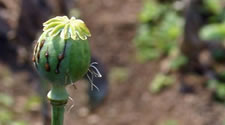 DEA agents raided the reservation of Wisconsin's Menominee Indian Tribe on Oct. 23—destroying what federal authorities say was a crop of illegal marijuana, and what tribal authorities say was a field of industrial hemp. Acting US Attorney Gregory Haanstad says agents executed a search warrant and seized about 30,000 marijuana plants weighing several thousand pounds. But tribal chairman Gary Besaw flatly contradicted this. According to Milwaukee's CBS 58, he said in a statement: "I am deeply disappointed that Obama administration has made the decision to utilize the full force of the DEA to raid our Tribe. We were attempting to grow industrial hemp for research purposes in accordance with the farm bill."
DEA agents raided the reservation of Wisconsin's Menominee Indian Tribe on Oct. 23—destroying what federal authorities say was a crop of illegal marijuana, and what tribal authorities say was a field of industrial hemp. Acting US Attorney Gregory Haanstad says agents executed a search warrant and seized about 30,000 marijuana plants weighing several thousand pounds. But tribal chairman Gary Besaw flatly contradicted this. According to Milwaukee's CBS 58, he said in a statement: "I am deeply disappointed that Obama administration has made the decision to utilize the full force of the DEA to raid our Tribe. We were attempting to grow industrial hemp for research purposes in accordance with the farm bill."

 Opium poppy cultivation in Afghanistan decreased 19% in 2015, compared to the previous year, according to the latest Afghanistan Opium Survey figures released Oct. 14 by the Afghan
Opium poppy cultivation in Afghanistan decreased 19% in 2015, compared to the previous year, according to the latest Afghanistan Opium Survey figures released Oct. 14 by the Afghan  Cannabis legalization proponents in Canada are rejoicing in the wake of the Oct. 19 elections that gave the
Cannabis legalization proponents in Canada are rejoicing in the wake of the Oct. 19 elections that gave the  Burma's President
Burma's President  Being the governor of Mexico's Pacific coastal state of Colima seems to be high-risk proposition —even once you're out of office. Two gunmen shot
Being the governor of Mexico's Pacific coastal state of Colima seems to be high-risk proposition —even once you're out of office. Two gunmen shot  Here we go again.
Here we go again. 






Recent comments
2 weeks 1 day ago
2 weeks 1 day ago
5 weeks 2 days ago
6 weeks 1 day ago
10 weeks 2 days ago
14 weeks 15 hours ago
18 weeks 20 hours ago
18 weeks 6 days ago
28 weeks 6 days ago
32 weeks 6 days ago